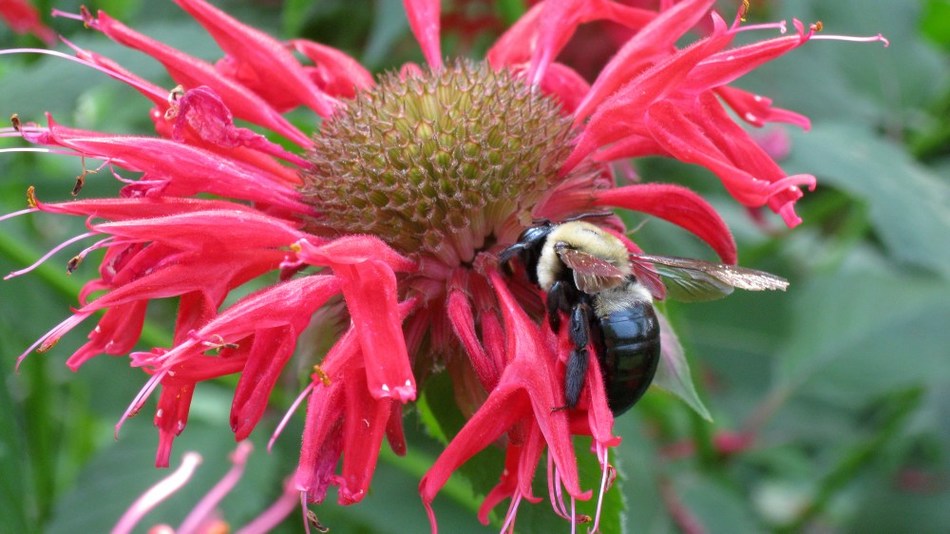New Survey Shows Protecting Honeybees And Other Pollinators Is A Major Concern Among Americans
Ortho Works to Help Gardeners Increase Pollinator Habitats In Their Own Backyard During National Pollinator Week: June 19-25
MARYSVILLE, Ohio, June 19, 2017 /PRNewswire/ -- A new survey commissioned by Ortho, the nation's leading brand of garden control products and the first national lawn and garden brand with a pledge to promote pollinator health, shows the majority of Americans (69 percent) recognize pollinator populations are in decline, but many don't know what to do to help.
"The loss of habitats plays a large part in the declining population of pollinators. That's why we're encouraging individuals and communities to plant gardens that attract and feed these insects," said Tim Martin, Vice President & General Manager, Ortho. "It's important to practice responsible pest management while maintaining gardens, and this new survey shows that homeowners want to feel comfortable and informed as they seek to attract pollinators to their outdoor spaces."

Honeybees and other pollinators are essential for maintaining a healthy ecosystem, playing a key role in the growth of fruits and nuts. While these insects provide us with some of our favorite foods, they often can't find enough food themselves.
"Every garden can help provide food and forage spaces for bees, butterflies and other pollinators, these natural habitats are an easy way to boost pollinator activity," said Martin. "We hope to set an example as we convert two acres on our campus in Central-Ohio to a natural prairie habitat composed of tall grass and native wild flowers."
Just last year, the Ortho brand pledged to eliminate neonicotinoids from its outdoors products and broaden its range of pesticide options for consumers. They also announced a multi-year partnership with the Pollinator Stewardship Council to help educate homeowners on the safe and appropriate use of pesticides. As part of the effort, Ortho has committed to making communications with consumers easier and is encouraging federal officials to allow for clearer language on product labels concerning appropriate use in areas where pollinators may be found, as the survey also revealed that 64 percent of Americans check gardening products for use instructions around pollinators.
Whether you have a large backyard or the perfect patio for a container garden or window box, planting a pollinator garden is easy:
- Choose wisely: Plant native when possible and select plants with colorful blooming flowers that have continuous bloom cycle, providing spring-to-fall food and nectar.
- Add a water source: A small bird bath or a decorative rock with crevices where rain water can pool will do the trick.
- Select a sunny area that's not too breezy: Many blooms will need up to six hours of sunlight each day and pollinators often have delicate wings, so finding a spot that's sheltered from the wind will help.
- Be mindful of the products you choose: A majority of Americans (72 percent) think it's impossible to use pesticides without harming bees; however, it is possible for gardeners to more closely target their application of pesticides and minimize exposure to beneficial pollinators.
- Follow directions: When using gardening products designed to protect plants from pests and disease, always follow the package instructions. Apply control products early in the morning at dawn or later in the evening at dusk when pollinators are not typically active in the garden, and avoid application of control products to flowers and other areas where pollinators like to land.
For more information on pollinator education or how to build a successful pollinator garden, visit Ortho.com/pollinator.
Survey Methodology
The Ortho Survey was conducted by Wakefield Research (www.wakefieldresearch.com) among 1,000 nationally representative U.S. adults 18+, between June 8 and June 9, 2017 using an email invitation and an online survey. Quotas have been set to ensure reliable and accurate representation of the U.S. adult population 18 and older.
About Scotts Miracle-Gro
The Scotts Miracle-Gro Company is the world's largest marketer of branded consumer products for lawn and garden care. The Company's brands are the most recognized in the industry. In the U.S., the Company's Scotts®, Miracle-Gro® and Ortho® brands are market-leading in their categories, as is the consumer Roundup® brand, which is marketed near worldwide by Scotts and owned by Monsanto. In the U.S., we maintain a minority interest in TruGreen®, the largest residential lawn care service business, and in Bonnie Plants®, the largest marketer of edible gardening plants in retail channels. In Europe, the Company's brands include Weedol®, Pathclear®, Evergreen®, Levington®, Miracle-Gro®, KB®, Fertiligène® and Substral®. For additional information, visit us at www.scottsmiraclegro.com.
Contacts: Kim Markus The Scotts Miracle-Gro Company 937-644-7290
Molly Jennings The Scotts Miracle-Gro Company 561-681-7683 |
To view the original version on PR Newswire, visit:http://www.prnewswire.com/news-releases/new-survey-shows-protecting-honeybees-and-other-pollinators-is-a-major-concern-among-americans-300475893.html
SOURCE Ortho
